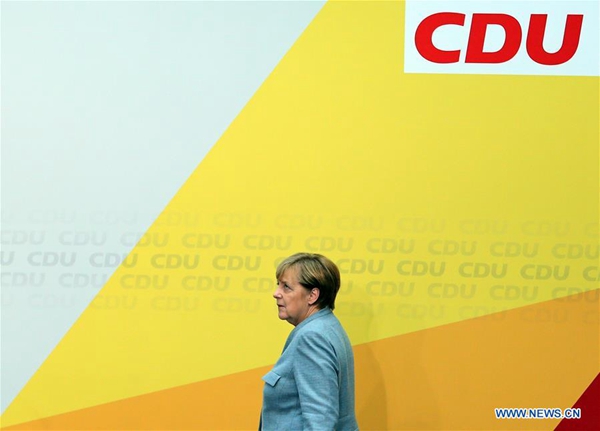Should we be concerned with AfD success in Germany?
- By George N. Tzogopoulos
 0 Comment(s)
0 Comment(s) Print
Print E-mail China.org.cn, September 28, 2017
E-mail China.org.cn, September 28, 2017
|
|
|
German Chancellor and leader of the Christian Democratic Union (CDU) Angela Merkel attends a press conference at CDU's headquarters in Berlin, Germany, on Sept. 25, 2017. (Xinhua/Luo Huanhuan) |
When German Chancellor Angela Merkel opened her country's doors to desperate refugees two years ago, she knew she was doing the right thing. She showed leadership at the EU level, revealing her human side and preventing further personal and family tragedies for displaced people.
However, she also knew her policies might cause some political repercussions in the medium-term and damage her Christian Democratic Union (CDU). An increase in the flow of refugees wishing to reside in Germany, instead of facing more chaos in the Middle East and North Africa, could fuel xenophobia and be a handy gift for the demagogues of a new right-wing populist party, the Alternative for Germany (AfD).
Although only born in 2013, the AfD managed to gain seats in the European Parliament one year later with a percentage of 7.10 percent. Subsequently, it looked for similar domestic success, finding the best opportunity exploiting Merkel's "open-door" policy.
The change of party leadership in the summer of 2015 was a turning point. Its former leader Bernd Lucke, a critic of a near-bankrupt Greece staying in the eurozone and the German-led rescue packages, quit and gave his position to Frauke Petry.
She quickly realized the anti-euro cause was no longer attractive and adopted a different approach, investing in a rhetoric against refugees that gained ground when terror attacks reached Germany.
The political rise of AfD was reflected in the recent federal election. For the first time, it managed to enter the Bundestag, Germany's Parliament. With a double-digit percentage of 12.6 percent, it is now the third strongest party in the country, partly overshadowing Merkel's poll victory.
Should the grand coalition between CDU and the Social Democratic Party (SPD) of Martin Schulz be extended, it will constitute the main opposition, although this scenario does not seem likely due to Schulz's skepticism.
Tobias Bütow, the director of the Euro-Mediterranean branch of the Centre International de Formation Européenne (CIFE), put it bluntly: "Merkel's success is the Bundestag's defeat. For the first time since World War II, a right wing extremist party has managed to enter."
In particular, some conservative voters decided to leave the CDU and its sister party in Bavaria, the Christian Social Union (CSU) and move right. Their number is estimated at 980,000. However, the AfD also took votes from the SPD and the Leftist party, Die Linke.
The initial post-election surveys outline the concerns of German citizens at this development, with 70 percent saying German society was drifting apart, 62 percent expecting a rise in criminality, 46 percent believing the influence of Islam was growing and 38 percent being unhappy with so many foreigners entering Germany.
From another perspective, electoral participation was 71.5 percent in 2013, but 76.3 percent this time. Ironically, as Philipp S?lhoff from the Berlin Progressive Zentrum (DPZ) explained, the higher turnout in a democratic process contributed to the triumph of a right-wing, xenophobic party.
Approximately 1.2 million people who had not voted four years ago went to the polls and supported AfD this time.
As it is happening with all right-wing parties in Europe, the profile of most AfD voters included many citizens without any higher education, being workers and coming from relatively poor or underdeveloped regions.
These characteristics can be geographically outlined. The AfD percentage was much higher in Eastern Germany (22.5percent) in comparison to Western Germany (11.10 percent). In Sachsen, it was the leading party with a percentage exceeding 30 percent.
Julian Plottka, a research associate of the Berlin Institute for European Politics (IEP) draws on the experience of local parliaments, where AfD already operates, to anticipate how the modus operandi of the Bundestag might evolve - especially harsher and more divisive debates in the next four years.
However, in his view, what is perhaps even more interesting is how the AfD will influence other political parties. Initial signs are not optimistic. CSU politicians, for instance, who openly disagreed with Merkel over her management of the refugee crisis, may employ a more aggressive approach. "Migration policy as well as internal security will be a major focus," he suggests.
It is premature to decide whether AfD will establish itself in German politics or not. Heterogeneity and internal disagreements - Petry has already announced her retreat - do not necessarily guarantee harmony. The most important challenge for the party will also be to preserve its public support principally attributed to a motivation protest rather than trust in alternative political thinking.
Last but not least, the remaining five parties in the Bundestag will certainly be keen on isolating AfD, responding to the general outcry and the country's stigmatized past. However, the new political reality in Germany is no longer an exception in preventing European far right ascendancy.
George N. Tzogopoulos is a columnist with China.org.cn. For more information please visit:
http://www.china.org.cn/opinion/GeorgeNTzogopoulos.htm
Opinion articles reflect the views of their authors, not necessarily those of China.org.cn.







Go to Forum >>0 Comment(s)